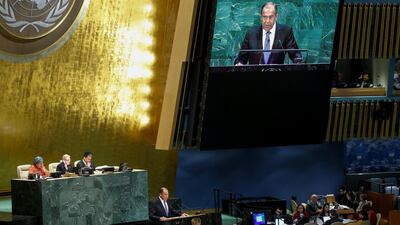Sergei Lavrov, the Russian foreign minister, lashed out at President Donald Trump’s handling of America’s global agenda at the United Nations General Assembly, vowing to resist his go-it-alone diplomacy.
"We observe the offensive of belligerent revisionism against the modern system of international law", Mr Lavrov said in his annual speech, adding the US indulged in “political blackmail, economic pressure and brute force”.
In particular, Mr Lavrov signalled opposition to the White House’s forthcoming Middle East peace initiative, calling for a return to the quartet format that includes Moscow. “I want to warn against a one-sided approach and attempts to monopolise the peace process," Mr Lavrov said. “We will make every effort, including in the within the Middle East Quartet, the Arab League and the Organisation of Islamic Cooperation. Mutually acceptable initiatives must lay the groundwork for a peaceful and secure co-existence of the two nations, Israel and Palestine.”
In an uncompromising message on Syria, Mr Lavrov condemned the US-led retaliation for the chemical weapons assault by the Syrian government on civilians in April. He again warned, without evidence, against rebel provocations.
Proclaiming that Russia had led efforts to thwart “regime change” in Syria, Mr Lavrov said the Russian-sponsored reconciliation talks was the only route to peace. “The Inter-Syrian Constitutional Committee now setting up in Geneva is the path to sustained settlement in Syria,” he said.
Russia is also at the forefront of the contest to define multilateralism and Mr Lavrov not only took issue with the new US approach but also those who advocate the strengthening of the international rules-based order.
China too set out its global challenge to the US by stating that the Belt and Road Initiative (BRI) has become the leading platform for international cooperation across the planet.
Wang Yi, Beijing’s veteran foreign minister, told the Assembly that BRI was the centrepiece of China’s offer to the world.
“The Belt and Road Initiative is a public good that China offers the world,” he said. “It has grown into the largest platform of international cooperation.”
Marking the 40th year of China’s reform and opening up process, Mr Wang said Beijing was working on taking the BRI to the next stage at a global conference next year.
With China engaged in a trade war with the US in the worst setback for global trade since the country joined with World Trade Organisation, Mr Wang told Washington to reverse course before inflicting permanent economic damage.
_______________
Read more:
Henry Paulson says China trade war risks long-term US pain
Donald Trump: China is interfering in 2018 midterms at UN Security Council
China's Sinopec halves Iran oil loadings under US pressure
_______________
“Protectionism will only hurt oneself, and unilateral moves will bring damage to all," he said. "Regarding trade frictions, China stands for a proper settlement based on rules and consensus through dialogue and consultation on an equal footing. China will not be blackmailed or yield to pressure."
Looking more broadly, the top Chinese diplomat separately warned that it was a mistake to lock in a Chinese versus America superpower rivalry. “Some American friends have proceeded from the Western theory of realism [that] in the past several hundred years, strong countries are bound to seek hegemony, and their conclusion is that China is about to seek hegemony and even challenge or displace US leadership.
"I want to tell you very clearly that this is a serious strategic misjudgement," Mr Wang added. "It is a misguided anticipation that will be extremely detrimental to US interests and the future of the United States.”

Addressing the annual meeting for the first time since the US and North Korea launched a major diplomatic effort, Mr Wang said the outlook for north Asia "has seen a major turnaround thanks to the efforts of all parties concerned.”
Mr Wang said China was encouraging North Korea "to continue moving along the right direction toward denuclearisation”.
Beijing joined with Russia in calling for the removal of sanctions on the isolated kingdom at a special meeting of the UN Security Council on Thursday. While America rebuffed the demands, it is also under pressure to bring forward a new structure for the North Korean talks.
"Effective settlement of the issue requires complete denuclearisation as well the establishment of a peace mechanism,” Mr Wang said.
